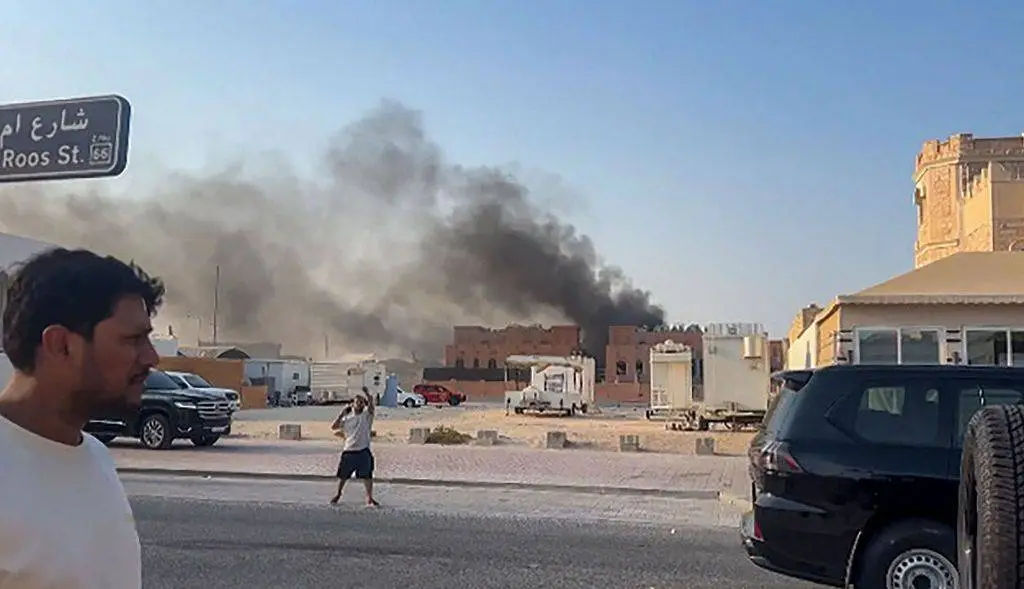Since the outbreak of a new round of large-scale Israeli-Palestinian conflict on October 7, 2023, Israel has leveraged its superior air power to launch airstrikes in the Gaza Strip and West Bank, Lebanon, Syria, Iran, and Yemen. Israeli Prime Minister Benjamin Netanyahu has repeatedly vowed to "change the face of the Middle East." On September 9, Israel's attack on Doha, the Qatari capital, sent shockwaves across the region.
According to Xinhua News Agency, the Israel Defense Forces and the Shin Bet General Security Service issued a joint statement saying that Israel carried out precision strikes against senior Hamas leaders in Qatar on the 9th.
Qatar is one of the United States' most important allies in the Middle East. Its Al Udeid Air Base is not only the largest US military base in the region, but also serves as the forward headquarters of the US Central Command. At the same time, Qatar has long supported US diplomatic efforts in the Middle East, working to facilitate indirect negotiations between Israel and the Palestinian Islamic Resistance Movement (Hamas) and promote a ceasefire in the Gaza Strip.
Multiple media outlets have pointed out that the Israeli airstrike on Qatar has severely impacted the long-standing national security policies of the Gulf Arab monarchies. Since the end of World War II, the Gulf Arab states have viewed the United States as the foundation of their security. They are not only the largest importers of US weapons, but have also significantly increased their investment in the US in recent years.
The Financial Times analyzed that the Gulf Arab monarchs believed they could use their economic and political influence to persuade the US to restrain Israel's behavior. However, "Netanyahu has shown us through this incident that Israel feels it has the shield and protection of the United States and can act as it pleases, without any red lines," said Michael Waheed Hanna, director of the US program at the Belgium-based International Crisis Group think tank.

Smoke billows after an explosion in Doha, Qatar, on September 9, 2025, local time.
Even America's closest allies are not immune.
In May of this year, US President Trump visited Qatar, becoming the first US president to make an official visit to the country. Qatar rolled out the red carpet for Trump, promising hundreds of billions of dollars in investment and even gifting the US government a luxurious Boeing 747 as a temporary replacement for Air Force One. Trump praised his "beautiful friendship" with Qatari Emir Sheikh Tamim bin Hamad Al Thani.
Recently, with renewed efforts by Qatari mediators, a new Gaza ceasefire agreement was placed on the table of Hamas political leaders. This US-proposed plan, reportedly approved by Israel, would offer a brief respite to the devastated Gazans if accepted by Hamas political leaders.
As usual, on September 9th, local time, these Hamas leaders gathered in their offices in Doha to discuss their response to the latest US proposal. The world awaited the outcome of the Hamas meeting, including senior US officials in the White House.
It was at this moment that Israel launched the attack. On the afternoon of the 9th, local time, explosions echoed through the tranquil Gulf capital, sending plumes of black smoke billowing into the sky. Over a dozen Israeli fighter jets fired more than a dozen missiles at a house where Hamas political leaders were gathered, targeting Khalil Haya, a key Hamas political leader.
"No one expected this to happen; it's absolutely shocking," Mehran Kamrawa, a professor at Georgetown University Doha, who was teaching students at the time of the missile attack, told the Financial Times. "Israel is carrying out its attacks with complete impunity, not only in Gaza but also elsewhere."
In an interview with CNN on the 10th, Qatari Prime Minister and Foreign Minister Sheikh Mohammed bin Abdulrahman Al-Thani said Israel's attack on Hamas leadership in Doha showed that Netanyahu was "trying to undermine any chance of achieving stability and peace."
Key Mediator in the Middle East
The Israeli airstrike not only disrupted the ceasefire negotiations in Gaza but also dealt a severe blow to Qatar's long-standing efforts as a key mediator in the Middle East. Since the 1990s, Qatar has established itself as a hub for gathering and exchange. The Qatar Economic Forum and the Doha Debate are the country's meticulously curated annual events, often called the "Davos Forum" of the Gulf region. In a 2021 interview, Al Thani defined Qatar as a "provider of energy and a promoter of peace." Qatar's 2003 constitution explicitly states that its foreign policy is based on "strengthening international peace and security by encouraging the peaceful settlement of international disputes."
As of July of this year, Qatar was actively engaged in 10 mediation processes. The June 28th peace treaty signed between the Democratic Republic of the Congo and Rwanda in Washington, D.C., was the result of Qatar's mediation. Qatar has also served as an intermediary in negotiations between the United States and Venezuela, coordinating issues related to prisoner exchanges and the deportation of migrants.
"Whenever there's a conflict or crisis, you see us," Qatar's Minister of State and Chief Mediator, Mohammed bin Abdulaziz Al-Khulaifi, told The Guardian. "Sometimes we feel like doctors, trying to find the right solutions for even the most complex cases, trying to provide them with the medicine they need."
Qatar's mediation efforts have also reaped potential rewards: they have gained recognition and trust from all parties, thereby expanding the country's international influence and network.
Sansome Milton, a senior researcher at the Qatar Center for Conflict and Humanitarian Studies, noted that Qatari mediators play different roles at different times: "The first role is that of a go-between: using Qatar's ability to communicate with all parties to convey information between antagonists. The second role is that of a persuader: convincing people to come together and ultimately reach an agreement. The third role is that of a facilitator: hosting the parties and providing other services."
Sources familiar with the mediation process reveal that Qatari mediators possess sophisticated mediation and rhetorical skills, able to minimize provocative language and unreasonable demands from both sides, thereby resolving conflicts between the negotiating parties.
Since the Hamas attack on Israel on October 7, 2023, Qatar's role as a mediator has further intensified.
Pushing for Israeli-Palestinian negotiations backfired
Unlike Oman, another Gulf country, Qatar does not play a "completely neutral" role.
Qatar has long maintained close ties with the United States, Saudi Arabia, Iran, and Hamas, initially framing this strategy as a security measure.
In 1961, Yusuf al-Qaradawi, the spiritual leader of the Muslim Brotherhood, was exiled to Qatar and subsequently developed close ties with the Qatari royal family. Qatar is the primary funder of Hamas, the Palestinian branch of the Muslim Brotherhood. After Hamas seized power in the Gaza Strip in 2006, Qatari economic aid became the primary source of income for the Hamas-controlled Gaza government. According to the agreement reached between Qatar and Israel at the time, the Israeli government was responsible for transferring the aid funds to Hamas.
Following the outbreak of the Syrian civil war, Hamas opened an office in Doha in 2012, and the office of its main political leader was relocated from the Syrian capital, Damascus.
From the outside, Qatar's formal acceptance of Hamas was seen as tantamount to advancing "Islamic extremism" and an "extreme anti-Israel agenda." However, according to Qatar, the Hamas office in Doha was opened at the request of the United States, which sought to establish channels of communication with Hamas.
Palestinian historian Azzam Tamimi believes Qatar has an "extraordinary sympathy" for Palestinians and the Palestinian cause. However, this sympathy has not hindered Qatar's engagement with Israel.
Israeli political activist Gershon Baskin told the Guardian that he had been "skeptical" of Qatari mediation when he participated in the negotiations in October 2024, but found them "serious" and "genuine" in their efforts for peace. He then realized that Qatar was not simply supporting Hamas or opposing Israel, but was playing a "more complex" role.
However, assuming this "more complex" role is not easy. As a mediator, Qatar's actual role in the Gaza ceasefire negotiations remained limited. Qatar was unable to exert pressure on the negotiating parties or force any one side to accept an unacceptable agreement until Israel launched an airstrike on the 9th against Hamas political leaders meeting in Doha.
The missiles destroyed not only the homes of Hamas political leaders in Doha but also the Gulf Arab states' belief in national security. Hanna pointed out that the Israeli attack demonstrated the limitations of the security guarantees provided by the United States to the Gulf Arab states as their security guarantor.




